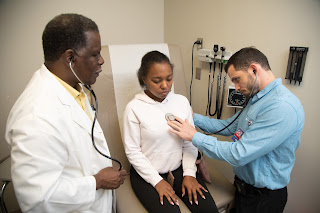As Dr. Martin Luther King Jr. Day approached, medical students at the University of South Alabama recalled the Civil Rights leader and the importance of drawing on his legacy as future physicians.
“Health equality was a central part of Dr. Martin Luther King’s vision for a better America,” said Angela S. Mosley-Johnson, of York, Ala., a fourth-year medical student at the USA College of Medicine. “He saw healthcare as a basic human right, which should be accessible, independent of a person’s race, economic status, religion, etc.”
“It’s very important to be aware and empathetic to this history because some patients may be reluctant to seek medical help because of it,” said Mosley-Johnson, who intends to pursue a career as an OB/GYN. “I love that there is scheduled time to commemorate Dr. King’s vision each year, but we also must all do our part to help fulfill his vision of quality, accessible health care for all.”
Brittany Jackson, a third-year medical student, said that King’s legacy compels medical students to care for all patients and to address health inequities in our communities. “It is crucial that every patient, regardless of race, background, culture or socioeconomic status, receive the best medical care that we, as physicians, have to offer,” she said. “We must work to fight for health equality at all costs, as it affects our patients and our communities.”
Jackson, who is co-vice president of the USA chapter of the Student National Medical Association, said that, as an African American woman, she is continuously reminded of MLK’s contributions. “Not only do we commemorate his vision with a single holiday, but we also have the opportunity to live out his vision each day, striving to serve with dignity and compassion,” she said.
“MLK Day is an opportunity for every person to contribute to this vision,” said Franklin Trimm, M.D., associate dean for diversity and inclusion at the USA College of Medicine. “We can support those in need. We can volunteer for a community service organization. We can improve our own understanding of the impact of race inequality.”
The Office of Diversity and Inclusion (ODI) encourages everyone to consider:
- A virtual town hall meeting, “Thursday Talk with the 100 Black Men: COVID-19 and Healthcare 2.0” is set for 6:30 to 7:30 p.m. Thursday, Jan. 14. It is hosted by the 100 Black Men of Mobile, Inc. Registration is available on Eventbrite.
- USA MLK Week of Unity & Service 2021. Activities on this site include ways to help the homeless in our community, a virtual screening of the film, “There’s Never Been a Time,” and a virtual panel discussion on “Equal Justice across Generations.” The Office of Diversity and Inclusion, located in the Medical Sciences Building on USA’s main campus, is a drop-off site for contributions for those experiencing homelessness.
- A virtual screening in February of the new documentary film “Black Men in White Coats.” Stay tuned for details.

